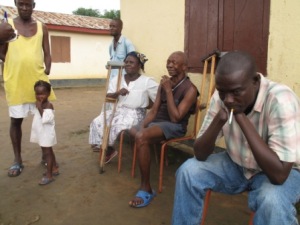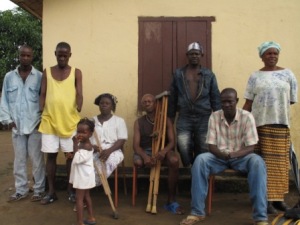Ashley: Just when I thought I had seen the worst of it, the fragile clutch of my hopeful spirit took yet another blow.
After interviewing Reverend Spencer (Kissi Town Shelter founder and Makripodis School Principal) on the dismal state of his shelter home and school, Jonah and I sat, once again speechless, struggling for a way to give immediate and realistic encouragement to this selfless man. Painfully conscious once again of the huge divide between our world and that of Reverend Spencer, Jonah reiterated the importance of telling the individual stories of Sierra Leoneans to his students and everyday Americans. “When Americans hear about Africa, they hear numbers and statistics. Yes, they are horrible, and sad,” he said. “This many dead, this many living on under a dollar a day. We have to turn these numbers into names…tell the stories…make the human connection.” He mentioned the Africa unit he teaches at the Marin School and that the main book he uses, titled, “A Long Way Gone,” about a boy soldier in Sierra Leone. I mentioned that my senior thesis was about peace building in post-conflict Sierra Leone. Surprised and grateful to hear that students in America were learning about his country, the Reverend replied, “Ah!? Wonderful! So you came here to see it for yourself, did you? Have you visited the amputees yet? “
Perhaps the most senseless and disgusting element of the Sierra Leone war was the rebels’ tactic of systematically chopping off thousands of innocent civilians’ limbs, for reasons that cannot be rationally explained. They went for the young and the old, sometimes amputating babies not old enough to crawl. The result: thousands of farmers unable to work their land, students unable to write, business people unable to type, athletes unable to run. I’ve seen many amputees since we arrived here a couple of months ago. Mostly we see them in Central Freetown, gathered in groups and begging for change or food. Some are in wheelchairs, others in wagons with awkward hand cranks, I guess the more affordable (and less comfortable) means of mobilization. We met a couple of boys who played for the amputee football league, strapping, youthful, and robbed of an invaluable leg. I have yet to see any prosthetics. It’s pathetic.
Perhaps the second most senseless and disgusting element of the war was, and is, the government’s handling of the thousands of civilian amputees. I became aware of this pitiful truth when Reverend Spencer scheduled us a visit to an amputee camp on the outskirts of Freetown.
The leader (or spokesman of sorts) of the amputee camp, Ishmail Daramy, agreed to us coming and interviewing himself and the other residents. York Road Amputee Camp was built by the Norwegian Refugee Council in 2002 and has been home to 10 amputees and their families ever since. The Norwegians paid for the construction of the rudimentary buildings while the World Food Program supplied the amputees with about 6 months worth of food. Since then, funding from the Norwegians has ceased, food supply has been cut, and the residents of York Road have been left to fend for themselves.
As soon as we arrived at the camp, Ishmail greeted us outstretched wrists; both hands stolen 13 years prior. As if fearful of a missed opportunity, he quickly began to illustrate the litany of injustices faced by the Sierra Leonean amputees. “We are suffering greatly,” he said over and over again. Struggle and frustration was written all over his face; his eyes weary and the wrinkles in his forehead deepened by years of unspeakable grief. With a cigarette clutched between the stumps of his wrists, he asked kindly for a light. As we spoke, he looked me straight in the eyes, as if begging for help without having to say the words. He has begged enough and was clearly tired of it.

The government of Sierra Leone has done little, if anything to assist the amputees. The official response to these atrocities was, and is shameful. Ishmail informed us that the rebels began amputating civilians as early as 1994 in the rural areas of the country; however, neither the government nor the international community made anything of it until the RUF made it into the capital city, Freetown, in 1999. Only then did the amputating massacre that had ripped through the hinterland for the past five years make the headlines.
Ishmail was amputated at half past 8 in the morning on June 26th, 1996, in his home town of Kono, the most strategic diamond mining area in all of Sierra Leone. After his hands were severed by the rebels, he walked 15 miles through the bush to find a vehicle who could take him to the hospital. When he finally reached the hospital it was 10 o’clock at night, his life slowly fading away. This man was not a rebel, a kamajor, a government soldier, or a politician. He did not pledge allegiance to any faction of the war’s many splintered parties. He was an honest man doing honest work; a commercial driver trying to survive and support his family in the nucleus of a brutal war zone. He was pulled from his car and given no say in the matter…his hands would be cut off and that was that. The rebels wanted control of the diamond mines. If they took everyone’s hands or legs, there would be no one to fight back. This was the logic.
Once a final ceasefire was signed and the war was finally over, the Sierra Leonean government and UNAMSIL (the United Nations Armed Mission in Sierra Leone) orchestrated a large DDR (disarmament, demobilization and reintegration) program for the 40,000+ rebels who had been terrorizing the country for the past eleven years. The rebels went through counseling, schooling and/or vocational training in order to be reintegrated into civilian life. They were given a resettlement package which consisted of a $140 allowance, supplemented by several tools of their chosen trade to get back on their feet. Several NGOs and UN agencies worked with former combatants after the war and numerous services have been made available to ease their transition. Many of the former rebels are living comfortably today.
Meanwhile, the innocent people who lost one or more of their appendages at the hands of these rebels got nothing of the sort. The government of Sierra Leone made provisions to support the amputees in the Lome Accord (the ceasefire agreement which officially ended the war), yet nothing has been seen of these provisions to this day. Other than a few NGOs that supported the amputees with immediate (meager) assistance following the war, the ones victimized most by the rebels (who managed to survive) were the ones most neglected. With contempt in his voice, Ishmail admitted, “The ones who did this to us, we have to sit around and watch them become rich men. They got everything and we got nothing. If the government is going to pay someone for being a rebel, why shouldn’t my children take up guns?” How is that for a slap in the face?
In order to provide for his family, Ishmail has taken to begging on the streets. Regrettably, this is the fate of most of Sierra Leone’s amputees. All ten of the York Road amputees beg for a living. There has been no support structure put in place by the government to provide gainful employment opportunities for the large amputated population. Employers turn a blind eye to the men and women searching for a job with one arm, or one leg. Yet Ishmail’s concern is not for himself. He has long ago given up on hope for his own future. It is the fate of his 5 children that keeps him from sleeping at night. “How can I send my children to school? How can I give them an education so that they know better than to take up arms again? Education is the only hope for my children and this country. If my children don’t go to school, what is to keep them from starting another war?” What, then, is to keep them from repeating the past? Eight years after the war has ended, the state of education in Sierra Leone is dangerously similar to how it was before to the war started. Ishmail’s nightmare is all too close to reality.

When asked if he was resentful to the government for their neglect, his response revealed a painful truth. “Of course. The government has abandoned us. How are we supposed to survive? During the war, who was responsible for protecting us? The government. They failed to protect me and I was amputated – destroyed physically and psychologically. I paid my taxes during the entire war and they neglected their responsibility to my security; they failed to protect me. Now I am amputated and begging on the streets to survive. This is my situation now.”
I left York Road amputee camp feeling tired and angry. This place is so messed up.
Moving and beautifully written, Ashley!
Thank you for writting aobut this issue, very emotrional!
Love to you, karen